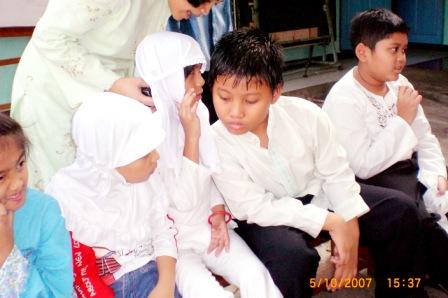 Harti Sulastri must repeat the spelling of “bioskop” (cinema) several
times before her students are able to grasp the correct spelling.
Harti Sulastri must repeat the spelling of “bioskop” (cinema) several
times before her students are able to grasp the correct spelling.She teaches a class of students with learning difficulties (LD) at the Learning Differences Pantara elementary school in Tebet Barat Dalam, South Jakarta.
Students with LDs encounter difficulties with reading (dyslexia), writing (dysgraphia), counting (dyscalculia) and speaking (dysphasia). They have average intelligent quotients (IQ), even higher than common students in some cases.
Teachers at Pantara, including Harti, whose majors are mostly psychology and special education, have found small classes are effective for their students to understand academic and social life better. “It’s difficult for LD students to concentrate in a big class, but a small class helps them to focus more on school lessons,” said Harti who has been teaching at Pantara for nine years.
The school limits seven to eight students to a class, with two teachers assigned. They work together and monitor the daily progress of each student. “It’s easy for teachers to monitor the progress of students in small classes if there are two teachers in each class. The teachers regularly communicate with students’ parents to keep them updated on their child’s performances,” she said.
Like regular schools, Pantara also implements the national curriculum. The only difference is that it encourages more of its students to understand the basic concepts first rather than speeding up lessons. “All the lessons are just the same as those in regular schools. We study social science, natural science, math and Indonesian. But we have an additional Social Problem Solving [PMS] subject handled by a psychologist,” said Deisi Anggraini Gautam, a psychology consultant in Pantara.PMS is a two-hour weekly class that functions to improve students’ self-confidence and social skills and it fits well with the small classroom model.
“Students in my class always do a role play for PMS. In every role play, each student will choose a role and they will play it as instructed. The psychologist in charge always makes sure that the role play carries moral lessons that can be applied in everyday life,” teacher Anissa Rizky said. She said that last week her students worked on a role play of a drug dealer who offered students drugs.
“The lesson for the students through the role play of a drug dealer is how to say ‘no’ when someone offers them drugs,” Anissa said. Teacher Dana Kusuma said that LD students varied in their abilities to understand materials given by their teachers. In her class, she placed her students in different streams, especially in math.
“I work more on the lower group to make sure they understand their assignments and give additional assignments to the higher group to keep them working so they don’t disturb the concentration of the first group,” she said.
Every student is given different daily responsibilities in the classroom to ensure they know how to take responsibility. “Today I assigned Defal to watch whether there was any student breaking classroom rules. He reported all the rule breakers and we discussed it at the end of the class. That way the students won’t repeat the same mistakes again,” Anissa said. (hrl)



Tidak ada komentar:
Posting Komentar